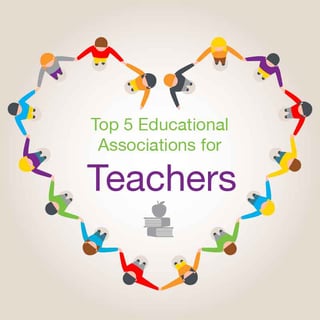
The good news is that professional associations can help you to keep up, move further along your career path, and even influence those laws. Sometimes just reading an association’s blog post or other available material can give you the information you need. With other organizations, you may want to become a full-fledged member to gain the maximum benefit.
Our list of the 10 most interesting educational associations out there is divided into two categories: one for teachers and one for administrators. In this post, Part I, we’ll tackle associations for teachers. Check out the list below and see which ones are right for you!
Associations for Teachers
CUE focuses on helping teachers make technology an integral aspect of their instruction and overall work process. Their blog is a great resource for teaching tips (for an example, see “Save Class Time, Be Awesome Longer”). The organization hosts an annual conference, and you also have the chance to gain recognition through the accompanying awards program. You can find award details at http://www.cue.org/awards.
KDP supports and advances its members throughout the different phases of their careers, from students to teacher educators and retirees. The society accepts only the cream of the crop, so a KDP membership will be a star on your resume! The website also offers an array of PDFs, podcasts, and teacher-created lesson resources and materials for members. You may even get a grant for classroom expenses.
PDK International, publisher of Kappan magazine, is the original member of the PDK International family of education associations, which also includes Pi Lambda Theta (PLT) for collegiate preservice and practicing teachers and Educators Rising for precollegiate prospective educators. Members participate in international study tours, such as an upcoming 10-day service learning tour in Peru. Also, the PDK Educational Foundation offers a variety of ways for members to get financial assistance for school, research, and education projects.
TCEA supports educators who use digital tools with their curriculum. The blog has a few Texas-specific posts, but it also has some helpful general tips, such as “Tools to Help You Better Communicate with Parents.” TCEA is best known for its conferences and events such as the Annual Convention & Exposition and the Tots and Technology summer conference for elementary educators. It also provides educators with opportunities to gain certifications through a series of online courses and webinars.
We list this as a resource for teachers, but ASCD’s 125,000 members include superintendents and principals, so the association definitely bridges the gap. You can search the website for articles or book excerpts on various instructional practices and concepts. Read the Pathfinder career article series for advice on both sides of the hiring process.
If you opt to become an ASCD Select and Premium member, you can obtain new books with in-depth analyses of your topic of interest – at no charge. Additionally, members can access ASCD’s member-only webinar series and other online professional development tools and services, such as professional learning institutes (PLIs).
Stay tuned for Part II of this blog, on associations for administrators. In the meantime, if we missed any ‘must joins,’ please let us know in the comments section below.
Want to keep up with the latest industry trends? Sign up to be a regular subscriber to our Educator blog.